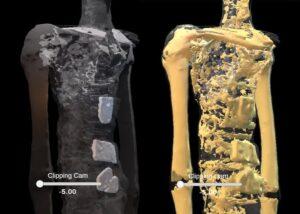Genetic Fringe : Unveiling the Dark Side of Oxitec Via Unpredictable Consequences In The Presumed Battle Against Ticks and Mosquitoes
Bill ticks again
Authored by Tanya Lewis via Scientific American Review



Ticks are annoying creatures. These nasty, bloodsucking parasites glom on to you when you least suspect it. And if they’re not removed in time, they can transmit a startling range of pretty horrible diseases.
The bite of the lone star tick, found in the U.S. South, Midwest and mid-Atlantic, can trigger a bizarre and sometimes dangerous allergy to red meat (such as beef, pork and venison), dairy, gelatin and some medications. Known as alpha-gal syndrome, the condition is caused by an immune reaction to the sugar alpha-gal (galactose-α-1,3-galactose), which is found in the flesh of most nonprimate mammals. More than 110,000 people in the U.S. tested positive for alpha-gal antibodies from 2010 to 2022, according to a July 28 report from the Centers for Disease Control and Prevention. But researchers think the actual number of people living with the condition may be closer to half a million—and cases are increasing.
Yet many health care providers don’t know about alpha-gal syndrome at all. A 2022 CDC survey, also reported on July 28, 2023, found that 42 percent of them had never heard of the condition. And more than a third of those who were aware of alpha-gal syndrome were not confident in diagnosing or managing it. If people with the syndrome consume animals or products with alpha-gal sugar, they can suffer reactions ranging from diarrhea to hives to anaphylactic shock. There is no treatment, and many patients are forced to radically alter their diet for years—or for life.
A Blacksburg, Va.–based company called Revivicor raises pigs that are genetically engineered to lack the alpha-gal gene with the aim of growing organs that can be transplanted into humans. The U.S. Food and Drug Administration approved these “GalSafe” pigs in 2020 for meat as well as medical use (though not specifically for transplants). Revivicor occasionally provides GalSafe pork to people with an alpha-gal allergy, but it does not sell the meat. “We try whenever possible to make GalSafe meat available to alpha-gal patients, but we are not meat producers,” says Dewey Steadman, head of investor relations at Revivicor’s parent company United Therapeutics. “We’ve been unsuccessful in our efforts to find a partner to produce GalSafe meat on a larger scale.” The company is focused more on manufacturing organs, he adds.
Scientific American talked to Gilbert Kersh, one of the authors of the July 28 CDC reports and chief of the Rickettsial Zoonoses Branch at the CDC’s Division of Vector-Borne Diseases, about what alpha-gal syndrome is and what doctors and the public should know about it.
What causes alpha-gal syndrome?
Alpha-gal syndrome is a tick-bite-associated allergic condition. We think people, a few weeks or maybe a couple of months after getting a tick bite, start having allergic reactions when they consume red meat or other products that contain the alpha-gal sugar. Alpha-gal is a sugar that is in most mammalian meat. But it’s not present in humans, so humans [with the condition] recognize it as foreign and have a reaction to it. These reactions take place when people are exposed to mammalian meat or other products derived from meat; this includes dairy products for many patients. These reactions will come two to six hours after they consume the meat or other product.
Alpha-Gal has been around since quite a while but you know something is wrong about it in nature.
Tick-borne diseases have become a cause for concern, leading some to question the origins and potential man-made nature of these infections. With their ability to infiltrate small populations, their elusive nature, and the serious health issues they can cause, it is no wonder that these diseases strike fear in the hearts of many. This article delves into the historical context surrounding tick-borne illnesses, the importance of prevention, and debunks common misconceptions regarding homemade remedies.
Historical Background
The roots of tick-borne diseases trace back to the unsettling realm of bioweapon research, which gained momentum in the 1940s. This raises suspicions about the possible man-made origins of these infections. Lyme disease, identified in the 1970s, and Powassan virus, discovered in the 1950s, emerged as alarming additions to the list of tick-borne illnesses. Alpha gal, a relatively new disease, coincides with the anti-red meat campaign, adding to the intrigue. It is worth noting that all three diseases were first discovered in Eastern North America, with Lyme disease being most prevalent in the New England area.

Oxitec’s Role
As Oxitec continues to make strides in the realm of genetic engineering, a cloud of uncertainty looms over their programs aimed at combating ticks and mosquitoes. While their innovative approaches show promise in curbing the spread of diseases like malaria, questions about the unpredictable consequences of these genetic interventions give rise to fear and apprehension. In this article, we delve into the potential risks and dramatic implications of Oxitec’s programs, urging caution and thorough examination before embracing these revolutionary solutions.

Unforeseen Outcomes: The Pandora’s Box of Genetic Modifications
Oxitec’s genetic engineering breakthroughs raise unsettling questions about the long-term effects and unintended consequences of manipulating the natural order. As we tamper with the genetic makeup of disease vectors, we may unknowingly unleash a Pandora’s box of unpredictable outcomes. What if these genetically modified mosquitoes and ticks evolve in unexpected ways, rendering our attempts to control them futile? The fear of inadvertently creating superbugs or genetically altered species that pose an even greater threat to public health looms large.
The Butterfly Effect: Ripple Effects on Ecosystems
The delicate balance of ecosystems could be disrupted by Oxitec’s genetic interventions. As we alter the population dynamics of mosquitoes and ticks, the repercussions extend far beyond disease control. What if the decline of certain mosquito species disrupts the food chain, impacting other organisms dependent on them for sustenance? The ripple effects of such interventions may lead to unforeseen ecological imbalances, affecting biodiversity and ecosystem stability in ways we can’t yet comprehend.
Regulatory Oversight: Navigating the Unknown
The fast-paced progress of Oxitec’s programs raises questions about the adequacy of regulatory oversight. Can we trust that the necessary precautions and rigorous testing have been conducted to ensure the safety of these genetic interventions? The unknown consequences demand a thorough examination of the potential risks and a robust regulatory framework that can keep pace with scientific advancements. Failure to do so may lead to irreversible damage and irreversible harm to both human health and the environment.
Community Concerns
Engaging and addressing the concerns of communities affected by these genetic interventions is crucial. Fear and skepticism surrounding genetic modifications are understandable, and it is imperative to have open dialogues and transparent information-sharing to bridge the gap between scientific advancement and public perception. Building trust, addressing ethical concerns, and allowing for informed decision-making will be essential in ensuring the acceptance and success of such programs.
While Oxitec’s programs offer glimmers of hope in the battle against ticks and mosquitoes, the potential risks and dramatic implications cannot be ignored. Unpredictable consequences, ecological imbalances, regulatory oversights, and community concerns cast a shadow of doubt over the efficacy and safety of these genetic interventions. As we navigate the unknown, it is crucial to proceed with caution, prioritize thorough research, and address the fears and questions that arise. Only through careful consideration and responsible stewardship can we strike a balance between scientific progress and the preservation of human health and the environment.

–
“Do Not Question The Nature of One’s Own Reality It’s A Sin Against God”
If you are interested in any of the issues raised in this article, please call the Samaritans for free on +44 116123 or visit their division at: https://www.samaritans.org
If you liked the post and want contribute to its cause leave us a contribution, anonymity guaranteed thanks to Monero :





